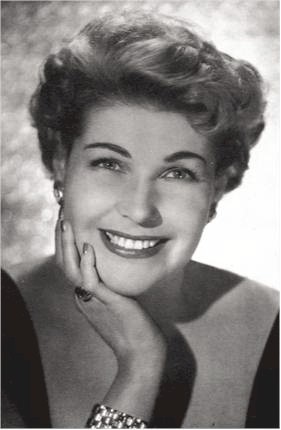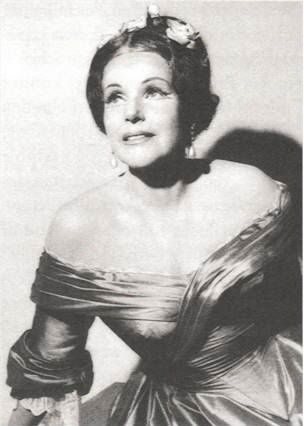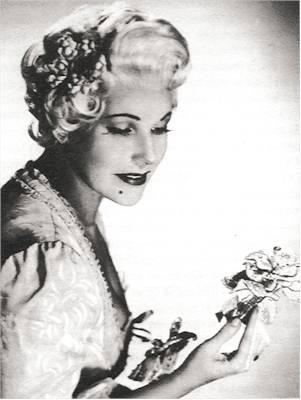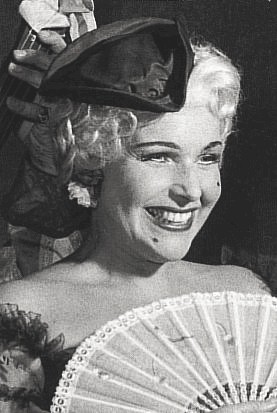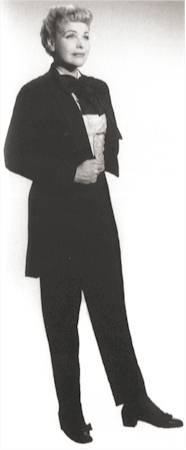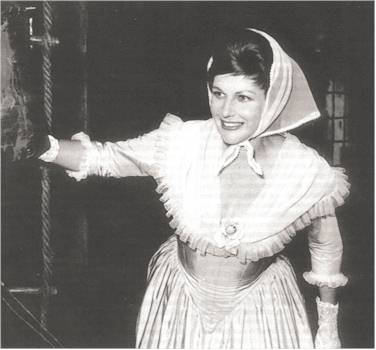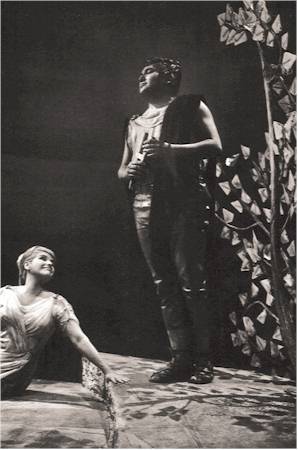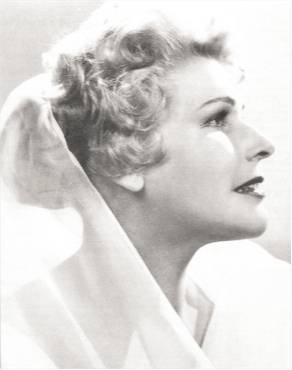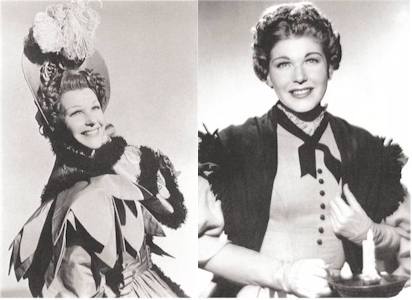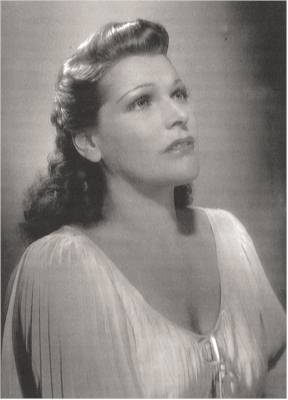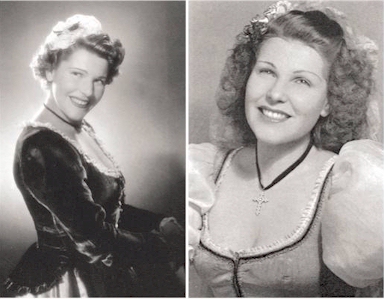Austrian soprano, 1917 - 1987
(Preiser Records) Biographical notes: Hilde Gueden was born Hulda Geiringer in Vienna and studied piano, voice and dance with Otto Giro and Maria Wetzelsberger at the Vienna Music Academy. She made her debut at the Vienna Volksoper in Benatzky’s operetta Herzen im Schnee. Her operatic debut was at the opera house of Zurich where she appeared as Cherubino. Although the soprano was of Jewish origin it was Clemens Krauss (!) who engaged her to the Munich State Opera, but she was soon forced to leave Germany. Tullio Serafin gave her the opportunity to sing in Rome and Florence. It was not until after the end of the war that she was allowed to return to the Munich State Opera where she remained an admired member until 1973. She gained great success abroad, at La Scala, Covent Garden, at the Grand Opéra de Paris, at the Glyndebourne Festival (Despina, Zerlina), at the Teatro La Fenice, the Maggio musicale di Fiorentino, and last but not least, at the Met, where she sang from 1951 until 1965. One of her greatest achievements was Rosalinde in Johann Strauss’ Die Fledermaus. At the Salzburg Festival she regularly appeared as Cherubino (1947, 1952, 1953), Zdenka, Zerlina (1946), Sophie (1949, 1953, 1960), Norina (1952), Aminta in Die Schweigsame Frau (1959), Zerbinetta (1954!), the Countess Almaviva (1963 - 1966), Anne Truelove in Stravinsky’s The Rake’s Progress and as Julia in the first performance of Boris Blacher’s Romeo und Julia (1950). Hilde Güden was a versatile singer, equally successful in operettas, lieder and oratorio work. She was considered as one of the most accomplished Mozart and Strauss singers of the time and was a much admired member of the so-called “Wiener Mozart Ensemble.” Hilde Güden in five of her greatest roles
As Rosalinde “Klänge der Heimat, ihr weckt mir das Sehnen, rufet die Tränen ins Auge mir! Wenn ich euch höre, ihr heimischen Lieder, zieht mich’s wieder, mein Ungarland, zu Dir! O Heimat so wunderbar, wie strahlt dort die Sonne so klar, wie grün deine Wälder, wie lachend die Felder, o Land, wo so glücklich ich war!”
As Sophie “Ich bin Euer Liebden sehr verbunden. - Ich ich bin Euer Liebden in alle Ewigkeit verbunden. - Hat einen starken Geruch. Wie Rosen, wie lebendige. - Wie himmlische, nicht irdische, wie Rosen vom hochheiligen Paradies. Ist Ihm nicht auch?”
As Zerbinetta (she sang this role exclusively at the Salzburg Festival, 1954) “Grossmächtige Prinzessin, wer verstünde nicht, dass so erlauchter und erhabener Personen Traurigkeit mit einem anderen Mass gemessen werden muss als der gemeinen Sterblichen. - Jedoch, sind wir nicht Frauen unter uns, und schlägt denn nicht in jeder Brust ein unbegreiflich, ein unbegreiflich Herz?”
As Zdenka (“Zdenko”) “Ich bleib ein Bub bis an mein End’. Ich will nicht eine Frau sein - so wie Du eine bist, stolz, kokett und kalt dabei!”
As Aminta “Ach Herr, dass ich es offen sag’, ich tät’es nur zu gern. Aber ich möchte es nicht, dass es Euch später gereut und Ihr Euch ärgert über die verlorene Zeit. Nicht, dass mir’s an Ehrfurcht vor Euch gebricht, aber versteht, ich fühl’ mich recht ungeschickt, die Worte zu setzen, und hör’ ich andere plaudern und schwätzen, so spür’ ich bedrückt, wie wenig ich weiss und die andern so viel.”
Daphne (with Fritz Wunderlich as Leukippos) “Unheilvolle Daphne! - Weil ein Gott dich geliebt, musste er sterben! O mein Leukippos! Geliebter Gespiele! Wieder erklingt mir die trauernde Flöte. Doch jetzt erlausche ich nicht des Windes Spiele. Jetzt weiss ich endlich, was du gelitten, jetzt sagt mir die Flöte dein ganzes Herz!” conducted by Karl Böhm / 1964 live, Theater an der Wien
As Euridice
Musetta Mimì
(Preiser Records)
As Pamina (Preiser Records)
Susanna Zerlina (Preiser Records) Comment: On 1 May 1945, before Worldwar II was officially ended, the Vienna State Opera resumed
operations with a performance of Mozart’s Le Nozze di Figaro under Josef Krips. It was at this place when the so-called “Viennese Mozart Ensemble” (Wiener Mozart Ensemble) began its
triumphant progress. The State Opera was bombed out, the singers had to sing at the “Volksoper”, later they moved into the “Theater an der Wien”.
Hilde Güden was one of the brightest Viennese stars - and one of DECCA’s busiest artists during the 50s and 60s. As a lyric and coloratura soprano she enjoyed remarkable success.
I would like to mention the names of some sopranos who also belonged to the Vienna (Mozart) Ensemble: Viorica Ursuleac, Hilde Güden’s voice was a high soprano of silvery gleam and youthful shining. It was very
responsive to coloraturas as well as to cantilenas (essential for Richard Strauss), and it was of a highly individual timbre. In my opinion, her Mozart singing was not always as secure as we would
expect (e.g. Exsultate jubilate). If you want to experience Güden’s charming personality, play her magnificent recordings of
Richard Strauss or her ravishing operetta recordings. She was the ideal Sophie, Zerbinetta, Zdenka, Daphne, Aminta - and, she is still unequalled as Rosalinde!
|
|||||||||||||||||||||||||||||||||||||||||||||||||||||||||||||||||||||||||||||||||||||||||||||||
